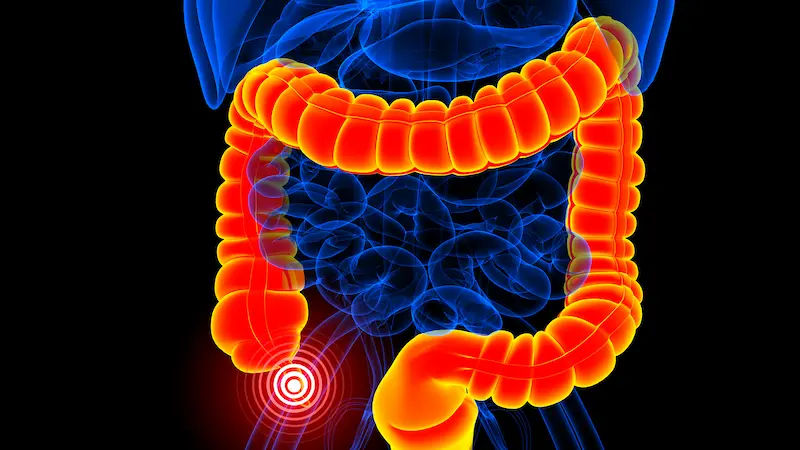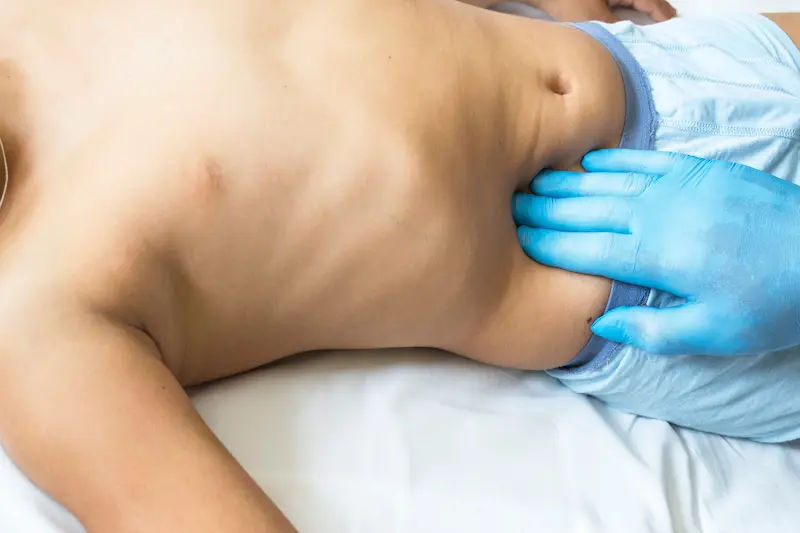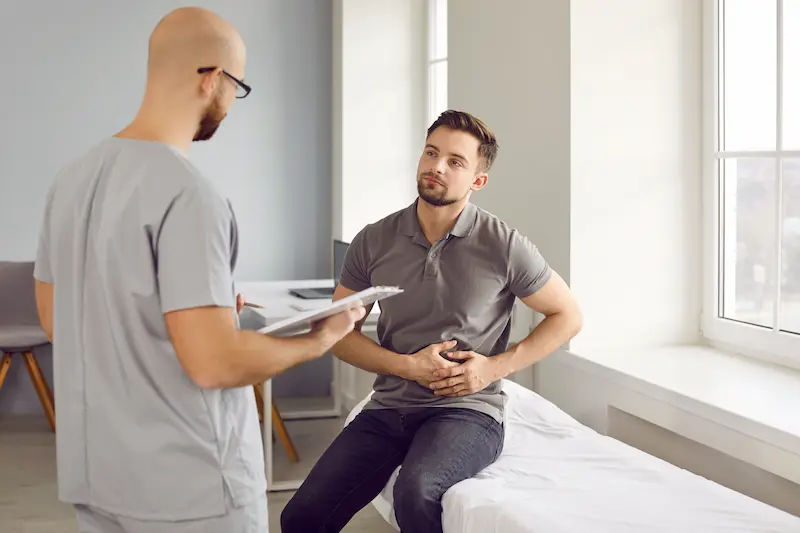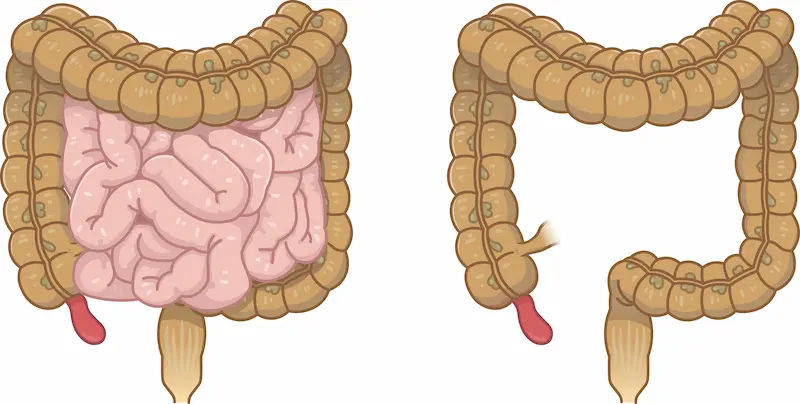Signs and Symptoms of Appendicitis
Learn the common signs and symptoms of appendicitis, including abdominal pain, nausea, and fever. Understand when to seek medical help to prevent complications like a ruptured appendix.

Written by Dr. Rohinipriyanka Pondugula
Reviewed by Dr. Siri Nallapu MBBS
Last updated on 28th Aug, 2025
.webp?tr=q-80,f-webp,w-350,dpr-2,c-at_max 700w)
Appendicitis is a common yet serious medical condition that requires prompt attention. If left untreated, it can lead to severe complications. Recognizing the signs and symptoms early can help you seek timely medical care and avoid complications.
What is Appendicitis?
Appendicitis is the inflammation of the appendix, a small, finger-shaped pouch attached to the large intestine. While the exact function of the appendix is not entirely clear, when it becomes blocked, due to infection, stool, or other reasons it can swell and become infected, leading to appendicitis.
Common Signs and Symptoms of Appendicitis
The symptoms of appendicitis can vary from person to person, but some common signs include:
1. Abdominal Pain
- The most telltale sign of appendicitis is pain that starts around the belly button and later shifts to the lower right side of the abdomen.
- The pain often worsens with movement, coughing, or sneezing.
- It typically becomes sharper and more intense over a few hours.
2. Loss of Appetite
- Many people with appendicitis lose their appetite and may feel nauseous.
3. Nausea and Vomiting
- Nausea and vomiting often follow the onset of abdominal pain.
- While vomiting can occur with other illnesses, if it accompanies severe abdominal pain, it may indicate appendicitis.
4. Fever and Chills
- A mild fever (usually between 99°F and 101°F) may develop as the body fights infection.
- If the appendix ruptures, the fever can spike higher, indicating a serious infection.
5. Changes in Bowel Movements
- Some people experience diarrhea or constipation.
- Difficulty passing gas may also occur.
6. Bloating and Tenderness
- The abdomen may feel swollen or tender to touch, especially in the lower right side.
7. Rebound Tenderness
- If pressing on the lower right abdomen causes pain that worsens when you release pressure, it could be a sign of appendicitis.
Consult top Surgeon
When to Seek Immediate Medical Help
Appendicitis is a medical emergency. If you or someone you know experiences:
- Sudden, worsening abdominal pain
- High fever (above 101°F)
- Severe vomiting
- Inability to pass stool or gas
- Extreme tenderness in the abdomen
Seek emergency care immediately. Delaying treatment can lead to a ruptured appendix, which can cause life-threatening infections.
How is Appendicitis Diagnosed?
Doctors diagnose appendicitis through:
- Physical Examination – Checking for tenderness in the abdomen.
- Blood Tests – To detect infection (high white blood cell count).
- Urine Test – To rule out urinary tract infections or kidney stones.
- Imaging Tests – Ultrasound or CT scan to confirm inflammation.
If you suspect appendicitis, book a consultation with a doctor on Apollo 24|7 for quick diagnosis and treatment.
Treatment for Appendicitis
The standard treatment is surgical removal of the appendix (appendectomy), which can be done through:
Laparoscopic Surgery (minimally invasive, small incisions)
Open Surgery (for severe cases or ruptured appendix)
Antibiotics may be given before or after surgery to prevent infection.
Can Appendicitis Be Prevented?
There is no guaranteed way to prevent appendicitis, but some lifestyle habits may help reduce the risk:
- Eat a high-fiber diet (fruits, vegetables, whole grains) to prevent blockages.
- Stay hydrated to keep digestion smooth.
- Avoid ignoring persistent stomach pain and early medical advice can prevent complications.
If you're unsure about your symptoms, consult a doctor on Apollo 24|7 for expert advice and timely care. Your health is important and never ignore warning signs!
Conclusion
Appendicitis can escalate quickly, so recognizing the symptoms early is crucial. If you experience sudden, severe abdominal pain, nausea, fever, or tenderness in the lower right abdomen, do not wait and seek medical help immediately.
Consult top Surgeon
Consult top Surgeon
Dr. Deepak G
General Surgeon
2 Years • MBBS, MS
Bengaluru
A.V.S Clinic, Bengaluru

Dr. Deepak Thakur
General Surgeon
10 Years • MBBS, MS General Surgery
Patna
Health Care Clinic, Patna

Dr Anubhav Chittari
General Surgeon
3 Years • MBBS, M.S GENERAL SURGERY
Bengaluru
PRESTIGE SHANTHINIKETAN - SOCIETY CLINIC, Bengaluru
Dr. Siva Prasad Arja
General Surgeon
4 Years • MBBS, DNB (GENERAL SURGERY)
Hyderabad
Seasons hospital, Hyderabad

Dr Venu Kumar K N
Vascular Surgeon
8 Years • MBBS, MS(General Surgery),M ch(Vascular Surgery) DrNB
Bengaluru
Apollo Clinic, JP nagar, Bengaluru
Consult top Surgeon
Dr. Deepak G
General Surgeon
2 Years • MBBS, MS
Bengaluru
A.V.S Clinic, Bengaluru

Dr. Deepak Thakur
General Surgeon
10 Years • MBBS, MS General Surgery
Patna
Health Care Clinic, Patna

Dr Anubhav Chittari
General Surgeon
3 Years • MBBS, M.S GENERAL SURGERY
Bengaluru
PRESTIGE SHANTHINIKETAN - SOCIETY CLINIC, Bengaluru
Dr. Siva Prasad Arja
General Surgeon
4 Years • MBBS, DNB (GENERAL SURGERY)
Hyderabad
Seasons hospital, Hyderabad

Dr Venu Kumar K N
Vascular Surgeon
8 Years • MBBS, MS(General Surgery),M ch(Vascular Surgery) DrNB
Bengaluru
Apollo Clinic, JP nagar, Bengaluru




